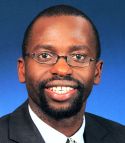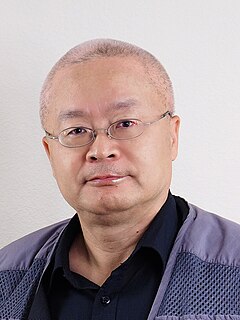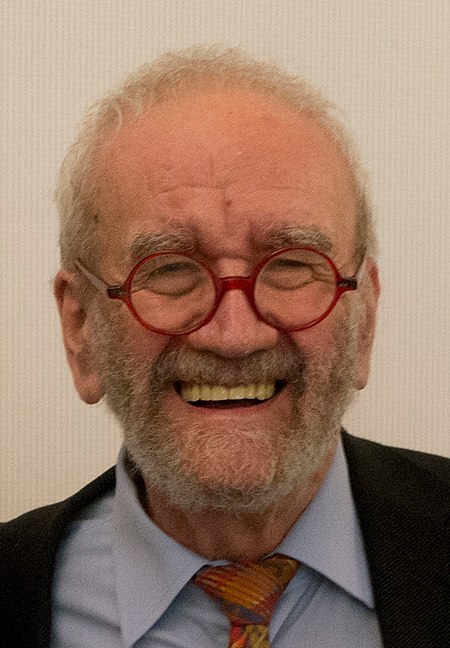
Kevin Warwick is an English engineer and Deputy Vice-Chancellor (Research) at Coventry University. He is known for his studies on direct interfaces between computer systems and the human nervous system, and has also done research concerning robotics.
Medical cybernetics is a branch of cybernetics which has been heavily affected by the development of the computer, which applies the concepts of cybernetics to medical research and practice. At the intersection of systems biology, systems medicine and clinical applications it covers an emerging working program for the application of systems- and communication theory, connectionism and decision theory on biomedical research and health related questions.
A superintelligence is a hypothetical agent that possesses intelligence far surpassing that of the brightest and most gifted human minds. "Superintelligence" may also refer to a property of problem-solving systems whether or not these high-level intellectual competencies are embodied in agents that act in the world. A superintelligence may or may not be created by an intelligence explosion and associated with a technological singularity.

The University of Klagenfurt is a federal Austrian research university and the largest research and higher education institution in the state of Carinthia. It has its campus in Klagenfurt.
Second-order cybernetics, also known as the cybernetics of cybernetics, is the recursive application of cybernetics to itself and the reflexive practice of cybernetics according to such a critique. It is cybernetics where "the role of the observer is appreciated and acknowledged rather than disguised, as had become traditional in western science". Second-order cybernetics was developed between the late 1960s and mid 1970s by Margaret Mead, Heinz von Foerster and others. Foerster referred to it as "the control of control and the communication of communication" and differentiated first order cybernetics as "the cybernetics of observed systems" and second order cybernetics as "the cybernetics of observing systems". It is closely allied to radical constructivism, which was developed around the same time by Ernst von Glasersfeld. While it is sometimes considered a break from the earlier concerns of cybernetics, there is much continuity with previous work and it can be thought of as a distinct tradition within cybernetics, with origins in issues evident during the Macy conferences in which cybernetics was initially developed. Its concerns include autonomy, epistemology, ethics, language, self-consistency, self-referentiality, and self-organizing capabilities of complex systems. It has been characterised as cybernetics where "circularity is taken seriously".
Roy Ascott FRSA is a British artist, who works with cybernetics and telematics on an art he calls technoetic by focusing on the impact of digital and telecommunications networks on consciousness. Since the 1960s, Ascott has been a practitioner of interactive computer art, electronic art, cybernetic art and telematic art.

Tshilidzi Marwala is a South African mechanical engineer and computer scientist. He became professor at the University of the Witwatersrand in 2003 and also chairperson of System and Control Engineering in South Africa.
Gerrit Broekstra, is a Dutch scientist and professor in the field of organization behavior and systems sciences at the Erasmus Universiteit, Rotterdam, Northwestern University, Chicago, and Nyenrode Business University in the Netherlands.
Klaus Krippendorff is the Gregory Bateson professor for Cybernetics, Language, and Culture at the University of Pennsylvania's Annenberg School for Communication.

Stuart Anspach Umpleby is an American cybernetician and professor in the Department of Management and Director of the Research Program in Social and Organizational Learning in the School of Business at the George Washington University.

The American Society for Cybernetics (ASC) is an American non-profit scholastic organization for the advancement of cybernetics as a science, a discipline, a meta-discipline and the promotion of cybernetics as basis for an interdisciplinary discourse. The society does this by developing and applying cybernetics’ concepts which are presented and published via its conferences and peer-reviewed publications. As a meta-discipline, it creates bridges between disciplines, philosophies, sciences, and arts. The ASC is a full member of the International Federation for Systems Research (IFSR).

Lenard Raphael Troncale is an American biologist, systems theorist, Professor Emeritus of Cellular and Molecular Biology, and former Director of the Institute for Advanced Systems Studies at the California State Polytechnic University.
Gennady Simeonovich Osipov was a Russian scientist, holding a Ph.D. and a Dr. Sci. in theoretical computer science, information technologies and artificial intelligence. He was the vice-president of the Institute for Systems Analysis of the Russian Academy of Sciences, professor at the Moscow Institute of Physics and Technology, and at Bauman Moscow State Technical University. Osipov has contributed to the Theory of Dynamic Intelligent Systems and heterogeneous semantic networks used in applied intelligent systems.
The Austrian Research Institute for Artificial Intelligence is an Austrian non-profit contract research institute. OFAI is a research institute of the Austrian Society for Cybernetic Studies, a registered scientific society founded in 1969.
Cybernetics and Systems is a peer-reviewed scientific journal of cybernetics and systems science, including artificial intelligence, computer science, cybernetics, human computer intelligence, information and communication technology, machine learning, and robotics. The journal was established in 1971 as Journal of Cybernetics and obtained its current title in 1980. It is published by Taylor & Francis in cooperation with the Austrian Society for Cybernetic Studies and the editor-in-chief is Robert Trappl.

Vladimír Mařík is a Czech scientist.
Paolo Petta is an Italian computer and cognitive scientist who is the head of the Intelligent Software Agents and New Media Research Group at the Austrian Research Institute for Artificial Intelligence. His main research areas include cognitive modelling of emotions, human aspects in interactions with artificial systems and coordination of situated cognitive systems.

Jason Jixuan Hu, is a Chinese American cyberneticist, independent scholar and managing director of WINTOP Organizational Learning Laboratory. He is noted for his work on "cognitive capacity in human communication, conflict resolution and cooperation solicitation," and on view on distance education in America.
Stefan Thurner is an Austrian physicist and complexity researcher. He has been professor for Science of Complex Systems at the Medical University of Vienna since 2009, external professor at the Santa Fe Institute since 2007, and guest professor at the Nanyang Technological University in Singapore since 2016.








